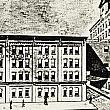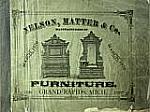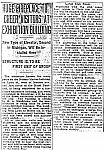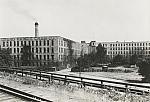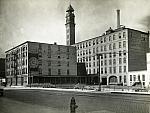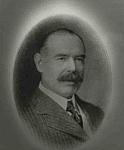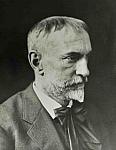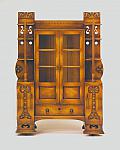Charles H. Radcliffe, Designer, Nelson-Matter Furniture Co.
Charles H. Radcliffe, one of the old-time furniture designers of Grand Rapids, died at his home here September 30, [1919] after an illness of ten weeks duration. Death was attributed to old age. He was born in Wiscarset, Maine, October 13, 1836, and would have been 83 years of age had he lived another two weeks.
Radcliffe moved from Wiscarset to Easton, Pennsylvania, where he entered the employ of the David Garis Furniture Company. His first connection with the local industry was made through George W. Gay, whom he met in Easton in 1876. The following year he moved his family to Grand Rapids, entering the employ of the Nelson-Matter Furniture Company as designer. He stayed with them until their collapse, and since that time had opened his own studio and been engaged in commercial designing.
Going back to Easton after a few months of service in Grand Rapids, Radcliffe was instrumental in enticing a number of his old-time associates to move to the Michigan furniture city. Some of them have since passed away, and all of them proved to be substantial loyal Gran Rapids citizens. Some of the “old-timers” in the industry will recall Isaac Rundio, Jacob Hoagland, and Charles Raab—foremen in the Nelson-Matter plant due to Radcliffe’s influence. He also brought Harry Stuart to Grand Rapids, and put him to work for Nelson-Matter. Later Mr. Stuart served a number of terms as city marshal. George Crater, who started the Grand Rapids Piano Company, is another protégé of Radcliffe’s.
A.S. White, for many years editor of The Artisan and a close friend of Radcliffe, contributes some additional information of personal character.
“My acquaintance with Mr. Radcliffe,” said Mr. White, “commenced in the year 1879. He was then in the employ of the Nelson-Matter Company as a designer and as an assistant to the superintendent, Mr. Matter. The firm, in addition to its regular trade, manufactured large quantities of furniture to fill special orders. Buyers in need of exclusive patterns would engage Radcliffe to draw the designs and details of the goods and the firm would make the same. At times this branch of the firm’s business would be so large that it became necessary to enlist the assistance of other local manufacturers to fill the contracts on time. The Worden Furniture Company, the Stockwell & Belknap Company, and Stowe & Haight were some of the companies that rendered assistance.
“The firm also engaged in the filling of orders for furnishing hotels and public institutions. Strength was considered of first importance by hotelkeepers, and Radcliffe was ever ready with the crayons to draw big, heavy stuff that met the demands of the landlords.
Radcliffe liked horses and for many years kept speedy roadsters and good carriages. Frequently he invited friends to ride with him in the country to admire the beauties of nature. In his work as a designer he was practical and sought to furnish such styles as the market for the moment demanded. He did not attempt to originate the long-looked-for distinctly American style that has not as yet been found. In 1881 he brought out a line in the style of Queen Anne that would please the trade and the public at the present time.
Furniture Manufacturer & Artisan, November 1, 1919, page 250.
Daily Artisan, January 3, 1898, page 8.

 facebook
facebook